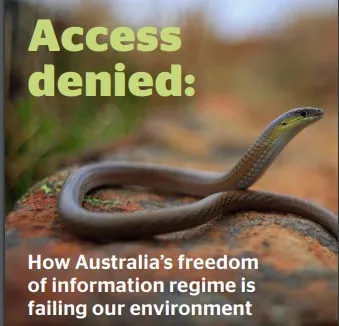
Journalists and activists will not be surprised by the Australian Conservation Foundation’s latest analysis of freedom of information statistics.
By Jackie Pearson
When Freedom of Information laws were introduced last century, they were heralded as a massive step forward in holding government departments and authorities to account. That was a very long time ago and “how I long for yesterday”. Representative democracy has copped a few near-fatal blows during the past four decades. We now live in an era where Freedom of Information and its state and territory equivalents are used to keep us in the dark.
The ACF found an increase in refused FOI requests, more redactions, higher charges and longer delays plaguing Australia’s system of access to government documents.
Refusal rates are rising, according to the ACF. The use of exemptions to prevent information being released is on the increase and particularly when it comes to information about the environment and how it is impacted by decisions made by Australia’s third-term pro-mining, pro-development at any cost Coalition Government.
“Over five years, the percentage of FOI requests refused outright by agencies with an environment-relevant portfolio increased by nearly 50%. In the same period, the percentage of requests released in full nearly halved.”
Delays are routine, the ACF found. More than a third of the decisions on ACF’s requests were not made by statutory deadlines. More than a third of ACF’s requests were fulfilled late, with 60% late by a month or more and 39% overdue by more than two months.
Environmental agencies are among those charging the most for FOI requests. Between 2015 and 2020, the average amount charged per request for environmental portfolios was double the average cost for all requests across government.
The federal Environment Minister, Sussan Ley, refused outright 39 FOI requests in the last financial year, while only one was granted in full and three were granted in part.
Government appears to be using lengthy review processes as a tool for denying access to information.
“Access to public information is central to ACF’s work of protecting the natural world against harmful or corrupt decisions,” said ACF’s democracy campaigner Jolene Elberth.
“There are fundamental flaws in the regime that is supposed to facilitate open and transparent government in Australia,” Elberth said.
“This has serious ramifications for efforts to tackle the climate crisis and protect Australia’s unique wildlife and precious natural ecosystems.
“All parliamentarians and observers who care about the transparency of Australia’s democracy should be concerned by these figures.
“It’s time for Australian governments to lift the veil of secrecy from information and decisions we all have a stake in.”
The ACF analysis drew from:
· Annual returns provided to the Office of the Information Commissioner (OAIC) by all agencies subject to the FOI Act.
· 109 freedom of information requests made by ACF between 2015 and 2020. These include requests made to Commonwealth, state/territory and local governments and agencies and ministers’ offices.
· FOI disclosure logs published by the Department for Agriculture, Water & the Environment; the Department of Industry, Science, Energy & Resources and the Department of the Prime Minister and Cabinet.
· Information Commissioner review decisions database and OAIC annual reports.
Read the whole ACF report here


